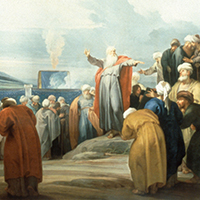Instructors: Yoram Hazony, Ruth Wisse, and Meir Soloveichik
Stipend: $1,000 (NYC area residents); $2,000 (Domestic US); $3,000 (International)
How can Jewish leaders in Israel and the diaspora benefit from a rediscovery of the distinctly biblical idea of freedom? What do the modern nations of the West, touched by the intellectual heritage of ancient Israel, stand to gain from a recovery of this inheritance?
The Torah and freedom are born together: Moses tells Pharaoh to “Let my people go that they may serve God in the desert.” This may be read as suggesting that Torah and freedom are not twins but rivals: You need to be free from oppression in Egypt in order to serve God. But a famous rabbinic dictum teaches that one cannot be free except in the service and study of Torah (Avot 6:2). What stands behind this assertion? And what are the implications for a society that pursues liberty without Torah?
Israeli political philosopher Yoram Hazony will lead an examination of the concept of freedom as it is developed in Hebrew Scripture and the Jewish tradition, and will compare the Jewish conceptions of freedom with modern liberal conceptions of autonomy and rights. This investigation will begin by exploring fundamental aspects of the biblical worldview—including the way in which the prophets think about the good and the holy, human nature and human nations, kingship and the state, and God. The central biblical innovation of an alliance (a brit, or covenant) between man and God will be seen as emerging from this complex of biblical concepts, and as the key to the Torah’s view of a freedom that is appropriate to human beings created in God’s image.
In parallel with our conceptual investigation into the Jewish meaning of freedom, we will probe historical case studies in the Jewish experience of freedom. Animated by its desire to live free from oppression, with equal rights of citizenship among the nations, and eventually, as free citizens in their own sovereign state, the modern history of the Jewish people can be told through experiments in liberty fraught with unexpected results. Through the lenses of literature and law, history and politics, Harvard professor emerita Ruth Wisse and Rabbi Meir Soloveichik of Yeshiva University and Congregation Shearith Israel will guide us through the Jewish experience of freedom in European and American history. By understanding the place of liberty in the shaping of the Jewish past, we will discuss the relationship between Judaism and freedom in the uncertain era that lies before us.
Alumni of the Tikvah Advanced Institutes are not eligible to apply for the Fall 2016 institutes, but may ask to audit.

